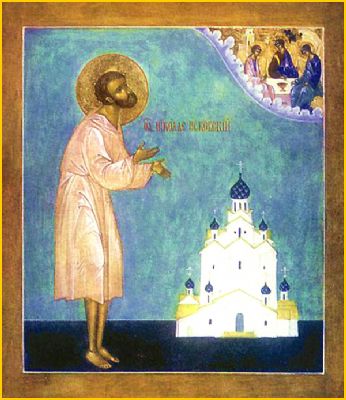|
|||
|---|---|---|---|
| This weekly bulletin insert complements the curriculum published by the Department of Christian Education of the Orthodox Church in America. This and many other Christian Education resources are available at http://dce.oca.org. | |||

Saint Nicholas, the Fool for Christ, confronted power in a most unusual way. Nicholas lived in the town of Pskov in the 16th century, during the reign of Ivan the Terrible. This tsar, who began his reign as a reformer determined to improve Russia, had become an unbalanced, murderous tyrant. He would order mass killings, and then would seclude himself in a monastery and pray intensely. The best-known story about the blessed Nicholas is set in a time when the feared Tsar Ivan visited Pskov. The inhabitants were terrified, and though they presented the customary welcome of bread and salt, they were not eager to encounter their ruler themselves. But Nicholas, already known as a fool for Christ, was not afraid. He came dancing into the tsar's presence riding a stick like a toy horse and chanting, "Little Ivan, little Ivan, eat the bread and salt! Eat no more of the blood of your people!" He ran away and hid before the tsar's soldiers could grab him, but his words had made an impression on the tsar, who made an effort to find him and then visited him in his shabby hut. Nicholas made special preparations for this visit, which the whole town was talking about. It was the first week of Great Lent, but he managed to find a piece of raw meat. When Tsar Ivan entered his hut, he bowed and offered the meat and said, "Eat, little Ivan!" The tsar replied with indignation, "I am a Christian and I do not eat meat during the Great Fast." His statement gave Nicholas the chance he had been waiting for. Nicholas said, "You do much worse than that; you consume the flesh and blood of your people. You not only forget the fast but God too." Once again, Nicholas' words had a deep effect on the tsar, who abandoned his plans to devastate the town. Nicholas had diverted the ruler from his destructive plans. But, like all Holy Fools, his primary goal was others' salvation. His "odd" behavior was meant to give Ivan a strong message. He risked the tsar's unpredictable violence, taking that chance because he cared for Ivan's soul, and knew that this powerful but deeply scarred man needed forgiveness more than most. No doubt he prayed with all his spiritual energy that God would grant that forgiveness to the ruler who needed it so desperately. Proverbs 1: 20-33 tells us: "Wisdom cries aloud in the street; in the markets she raises her voice, 'Give heed to my reproof.' " Nicholas "cried aloud" very publicly, and called on Ivan to "heed his reproof." As we are called to forgive each other, we have Nicholas' example of personal risk for another person's salvation. He took that risk because of his certainty that even the greatest sinners can find forgiveness in God. |
|||
